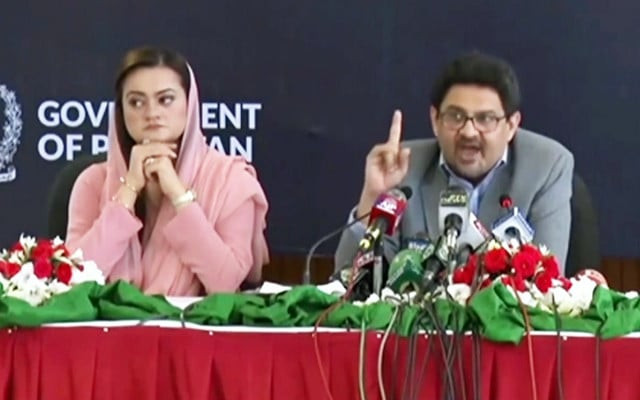Pakistan faced Rs5.1 tr default risk at end of PTI tenure: Miftah
Finance minister says he imposed 10% super tax on PM’s sons’ factories while Imran Khan gave 'amnesties to friends'

Federal Minister for Finance and Revenue Miftah Ismail revealed on Saturday that the country faced the all-time highest default risk of Rs5.1 trillion for the Financial Year 2022-23 as he presented the country’s economic overview to the media in Islamabad.
Taking the previous government to task, the minister for finance said “Imran Khan wreaked havoc everywhere” as he blamed the country’s economic deterioration on the Pakistan Tehreek-e-Insaf (PTI) government's tenure. “Imran Khan gave amnesty to his friends,” claimed the minister as he retorted “tell me, was this a time to do this?”
Miftah, while pointing fingers at the previous government’s alleged incompetence said “Khan sahib only knew how to usurp land by creating real estate amnesties and trusts”.
Live🔴 Federal Minister for Finance and Revenue Miftah Ismail along with Minister for Information Marriyum Aurangzeb briefing media on economic overview with presentation on#معاشی_استحکام_عوامی_خوشحالیhttps://t.co/l9kN9aeJpa
— Government of Pakistan (@GovtofPakistan) July 16, 2022
Thanking the coalition government for its “support”, the finance minister said he was optimistic “we will bring economic stability”. He promised that “we will reduce inflation and you will not see any load-shedding”.
Read Pakistan to receive $1.17bn tranche in three to six weeks: IMF
According to the government, during the PTI government’s rule, the default stood at nearly Rs2.4 trillion, while during the Pakistan Muslim League Nawaz’s (PML-N) reign it had been recorded at Rs1.66 trillion.
As per government statistics, the developmental budget decreased from Rs0.9 trillion to Rs0.55 trillion while the total debt increased by 79 per cent. Meanwhile, the trade deficit dived as low as $48 billion in the PTI government’s last year.
The finance minister argued that the previous government “broke the agreement it had itself negotiated with the International Monetary Fund (IMF)”.
He also claimed that the deal with the global lender was delayed by the previous government and that too was poorly negotiated. “According to the deal, a tax of Rs4 was to be imposed successively every month. This [deal] was agreed in November and broken in February,” said the minister.
Fuel prices and taxation
Reflecting on the situation in Sri Lanka, the minister said that “they did exactly what the PTI had done and now nobody can even buy petrol there”. He also said that PM Shehbaz had been unhappy with the price hike in petroleum products, but now “God has shown us good days”.
Pointing towards the super tax introduced in June on big firms', the finance minister said “I imposed 10% super tax on the prime minister’s sons’ factory”; meanwhile “Imran Khan imposed indirect taxes - a policy he had himself opposed”.
He also said that “we will give interest-free loans of Rs500,000 to the youth” in an effort to empower the largest age group of the Pakistani population.
He also added that the government had “removed tax on all seeds, fertilizer, and tractors” in an effort to ease the pressure on the agriculture sector.
Read more Rupee falls despite IMF deal
A devastated power sector
“It takes 500 billion to run the government,” said the finance minister, as he blamed Imran Khan for “destroying the power sector” and noted that “Rs1,350 billion were given as subsidy in the power sector alone”.
Amid gas load-shedding, “a circular debt of Rs1,300 billion was accumulated”. He further said that “neither did Imran Khan reduce transmission losses, nor was there any bill collection”.
“All these factors contributed to why the country went bankrupt,” added the minister.
Miftah Ismail also contended that while Nawaz Sharif’s government’s long-term contracts had been “scandalized”, so much so that “people were sent to jail for them”, “today if the country is running it is because of those agreements”. He also claimed that today there were no long-term agreements for LNG and diesel.































COMMENTS
Comments are moderated and generally will be posted if they are on-topic and not abusive.
For more information, please see our Comments FAQ